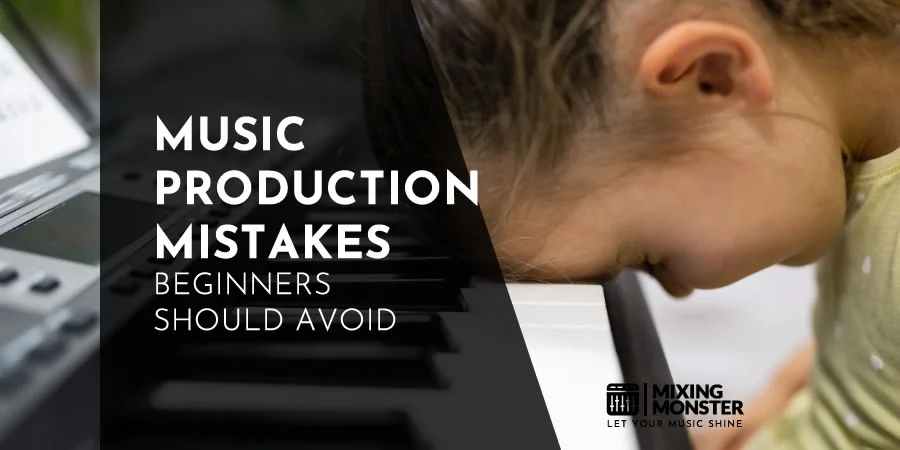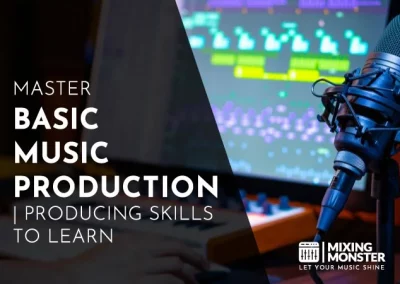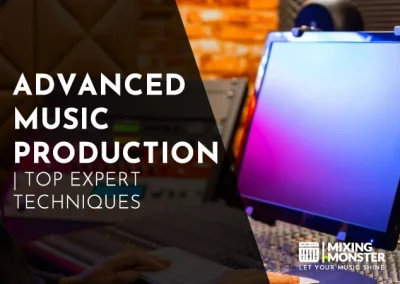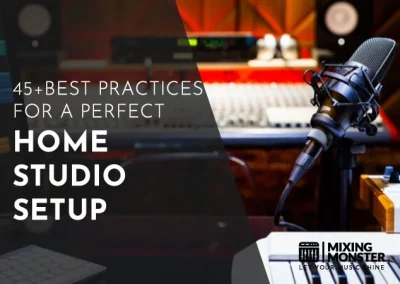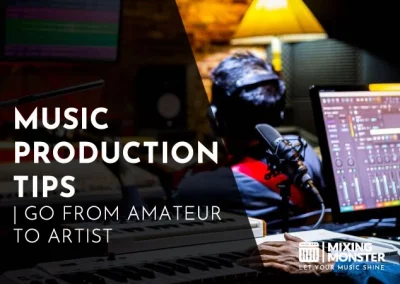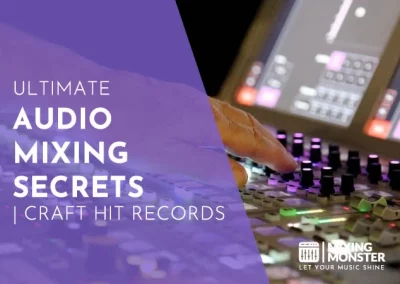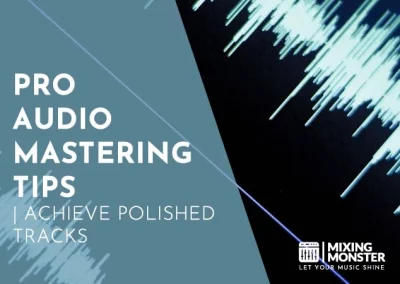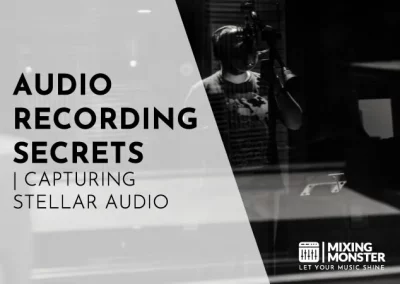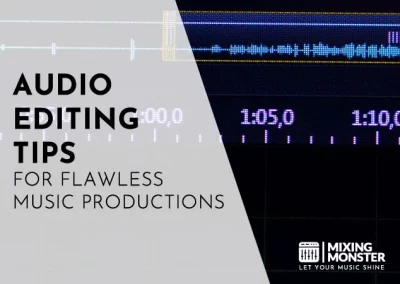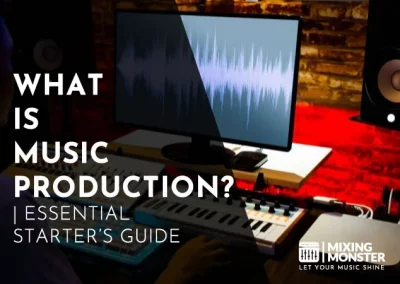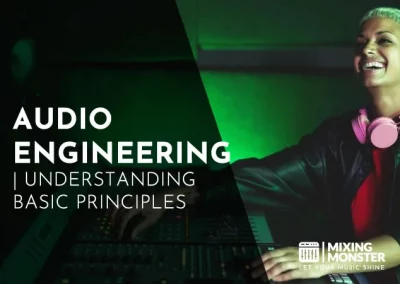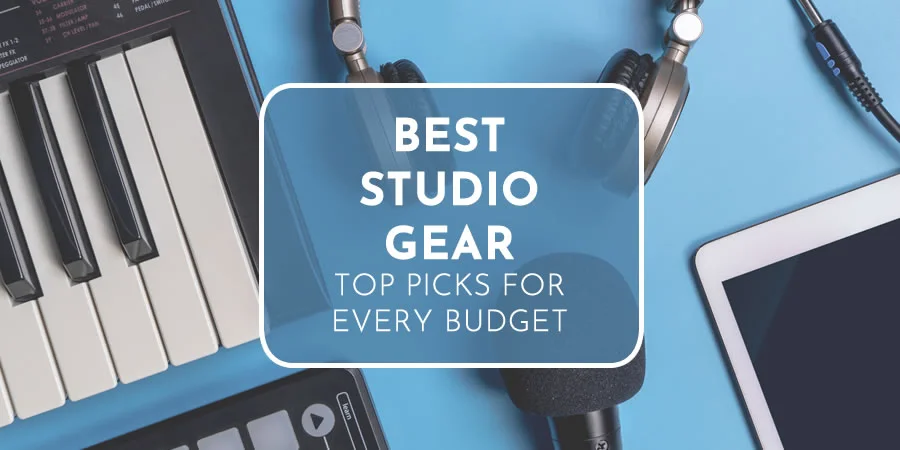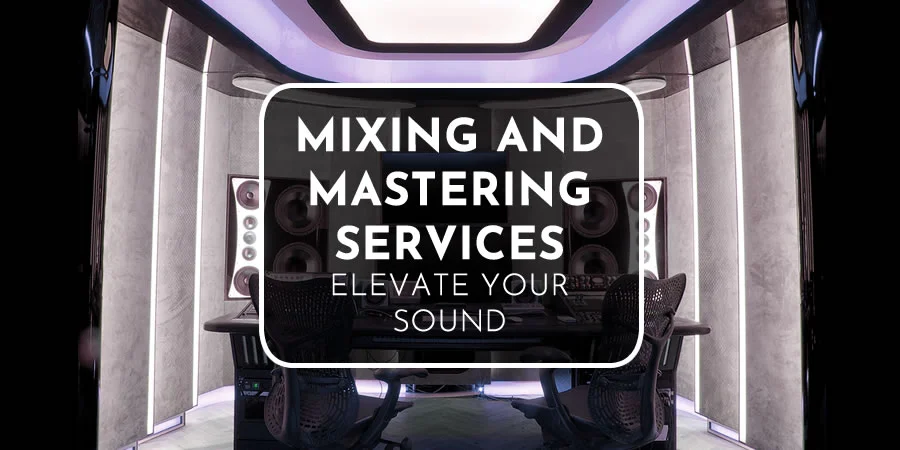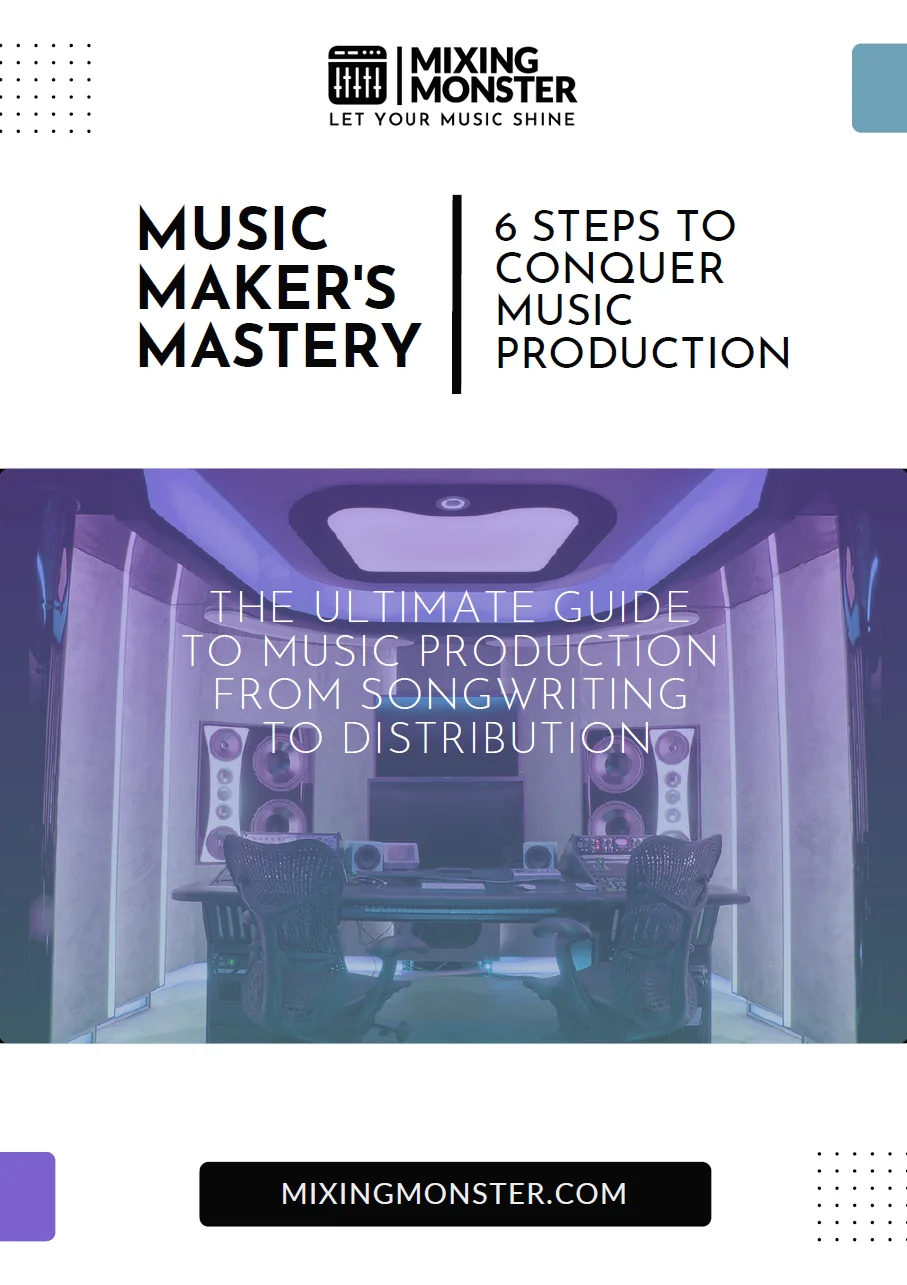Home > Blog > Music > Music Production
Disclosure: Some of the links below are affiliate links, meaning that at no additional cost to you, we will receive a commission if you click through and make a purchase. Read our full affiliate disclosure here.
Music production mistakes can be a significant roadblock in the journey of any producer, from beginners experimenting in their bedroom studios to seasoned professionals at the helm of state-of-the-art facilities. Each step in the music creation process is laden with potential pitfalls that can undermine the quality of a track, ranging from technical errors to creative misjudgments.
Music production is an art form demanding both creativity and technical prowess. Critical errors often occur at various stages, including setting up equipment, recording, editing, mixing, and mastering. These mistakes range from fundamental misunderstandings of music production principles to the overuse of presets and plugins. Producers must also stay vigilant about time management and know their work’s legal and ethical implications.
By understanding the common mistakes made during music production, you can sidestep potential issues and refine your skills more effectively. This article will guide you through the crucial do’s and don’ts, offering practical advice to help you navigate the complexities of music production with greater ease, ensuring your tracks are complete and crafted to meet professional standards.
KEY TAKEAWAYS:
- Proper music production requires a solid understanding of core principles and careful avoidance of common mistakes.
- Attention to detail during recording, editing, mixing, and mastering is essential for achieving a professional sound.
- Time management and knowledge of legalities are crucial to a seamless music production process.
Table Of Contents
1. Misunderstanding Music Production Fundamentals
2. Errors In Setting Up Your Music Production Workspace And Equipment
3. Recording Mistakes And How To Avoid Them
4. Common Audio Editing Oversights
5. Mixing Blunders To Bypass
6. Mastering Misconceptions And Missteps
7. The Drawbacks Of Overusing Presets And Plugins
8. Time Management And Project Organization Failures
9. Legal And Ethical Pitfalls In Music Production
10. Avoiding Music Production Mistakes As A Beginner
11. FAQ

1. Misunderstanding Music Production Fundamentals
Embracing the fundamentals of music theory and production is essential. With a solid grasp, your creative output might reach its potential, leading to foundational errors in your work.
Neglecting Foundational Knowledge In Music Theory And Production
You may be eager to dive into the practical aspects of music production, but overlooking basic music theory is a frequent misstep. Understanding scales, chords, and progressions form the backbone of successful compositions.
Here’s a clear way to focus on theory:
- Daily Practice:
Set aside time for music theory exercises to develop a strong foundation. - Application:
As you learn, apply theory concepts to your music production. It reinforces your knowledge and improves your practical skills.
Overlooking Resources For Basic Music Production Education
With countless tutorials and courses available today, skipping formal education on music production basics can lead you astray. Availing yourself of structured learning resources provides a roadmap to guide your growth.
Key steps include:
- Identify reputable tutorials on platforms like music production mistakes to avoid.
- Enroll in classes or workshops that cover both the artistic and technical sides of production.
Falling For Common Misconceptions That Lead To Music Production Mistakes
Navigate through the noise of misinformation by recognizing common fallacies that can misguide beginners. Remember:
- Loudness Doesn’t Equal Quality:
Detect the nuances between volume and clarity. - More Effects Do Not Mean Better Sound:
Discover how minimalism often enhances quality and lets your core idea shine.
By paying attention to these aspects, you’ll set a strong foundation for your journey in music production.
2. Errors In Setting Up Your Music Production Workspace And Equipment
Creating an optimal music production workspace is not just about buying the best equipment; it’s about making strategic choices that align with your budget, genre, and working style. Below, we explore common errors that could hinder your productivity and sound quality.
Missteps In Choosing Equipment For Your Budget And Genre
When selecting equipment, you must consider your financial limits and the specific genre requirements you’re producing. For example, investing in a high-end compressor may be less relevant for lo-fi genres, whereas a quality audio interface is crucial for recording acoustic instruments with clarity.
Visit Andrew Scrivens to understand how overlooked aspects, such as acoustic treatment, can impact sound quality.
- Budget Tip:
Start with essential items that impact your sound most. - Genre Tip:
Research your genre to identify which equipment is considered standard.
Overlooking The Importance Of An Ergonomic And Distraction-Free Workspace
Your workspace should encourage long periods of focus and creativity. This means having a comfortable chair that supports good posture, arranging your equipment within easy reach, and minimizing distractions. A poorly lit or cluttered workspace can lead to a lack of inspiration and even physical strain over time.
- Lighting:
Opt for adjustable lighting to reduce eye strain. - Workspace Layout:
Organize your gear in a way that allows you to work fluidly and comfortably.
Failing To Calibrate Equipment And Understand Signal Flow Properly
Every piece of equipment has optimal settings, and failing to calibrate can result in poor audio quality. Moreover, a solid grasp of signal flow is essential to troubleshoot issues quickly. Understanding your signal path from the sound source to the digital audio workstation (DAW) is crucial.
- Calibration Tip:
Spend time learning the ins and outs of each piece of gear. - Signal Flow Tip:
Sketch a diagram of your setup to visualize the signal path.
Addressing these common errors will set a strong foundation for your music production endeavors. Ensure your efforts and investments are not undermined by easily avoidable mistakes.
3. Recording Mistakes And How To Avoid Them
When diving into the recording stage, you must make informed choices regarding your equipment and environment to ensure a clean and professional result. Avoid common pitfalls that can undermine your efforts and compromise the quality of your recordings.
Poor Microphone Selection And Placement
Choosing the right microphone for the instrument or vocal performance you’re capturing is critical. Consider the microphone’s polar pattern and frequency response to match the sound source best.
For instance, a dynamic mic often works well for loud sources like drums, whereas a condenser might be better for capturing the nuances of a vocal. Placement is equally essential; even a tiny adjustment can significantly affect the sound.
As a general rule, avoid positioning the mic too close to the sound source to prevent an unnaturally bass-heavy recording, known as the proximity effect.
Recording At Excessive Volume Levels Leading To Clipping
Recording too loudly is a surefire way to introduce clipping, where the signal exceeds the maximum recording level and causes distortion. You should maintain healthy input levels, aiming for peaks to hit around -6 dB on your meters.
This ensures ample headroom for the mixed performance dynamics without risking unwanted distortion. Remember, amplifying a clean signal is easier than fixing a clipped one.
Ignoring The Impact Of Room Acoustics On Recording Quality
The room where you record can significantly influence the sound of your recording. Poor room acoustics can result in unwanted echoes, reflections, or an uneven frequency response. To mitigate this, treat your room with acoustic panels, bass traps, and diffusers that absorb and scatter sound waves.
For vocals and acoustic instruments, using a reflection filter can help limit the room’s impact. It’s worth investing in optimizing your recording environment to capture the truest representation of your performance.
4. Common Audio Editing Oversights
Editing is a crucial step in music production, where precision and a good ear can make the difference between an amateur and a professional sound. Your technical skills, how you use your tools, and how you manage your time can all impact the quality of your final product.
The Pitfall Of Over-Editing And Losing The Natural Sound
Beware of over-editing. When you apply too many adjustments or effects, your track can lose its natural feel and sound artificial. It’s not uncommon to find productions where the life of a performance is lost due to overzealous editing. To maintain the integrity of the original recording, use editing tools sparingly. Strive to enhance rather than overshadow the true essence of the music.
Misusing Editing Software Tools And Plugins
While software tools and plugins are powerful allies, misuse can lead to a subpar mix. Understanding the purpose and potential of each plugin is essential. For example, overusing reverb can cause tracks to sound distant or washed out, while excessive compression can lead to a lack of dynamics.
Focus on selective enhancement, and remember that sometimes less is more. Using your DAW‘s tools correctly can elevate your music, so take the time to learn its proper application.
Inefficient Editing Due To Poor Time Management And Workflow
Efficiency in editing is not just about working fast—it’s about working smart. An organized workflow supports productivity and helps you avoid time-consuming errors. Set up templates, use keyboard shortcuts, and develop a systematic approach to your work.
Break down your editing tasks into manageable steps and tackle them systematically. Good time management can significantly enhance your editing process and produce a professional sound.

5. Mixing Blunders To Bypass
Achieving a polished sound hinges on carefully manipulating the various elements in mixing. Understanding common mixing mistakes ensures that your mix maintains balance, clarity, and professional quality.
Losing The Balance Between Elements In A Mix
The interplay of different musical elements forms the core of your mix. Losing this balance often results in a messy and unfocused sound.
Ensure each instrument sits well with others, considering their frequency ranges and dynamic roles. Crucially, you want to avoid having any element overpowering the rest, as balance is vital to a cohesive mix.
Misapplying EQ And Compression
Using EQ and compression effectively enhances the texture and consistency of your mix. However, common errors include overuse of compression, which can squash the dynamics, and inappropriate EQ adjustments, such as excessive boosting, which can lead to a harsh mix.
Instead, use subtractive EQ to remove unwanted frequencies and apply compression judiciously to maintain natural dynamics.
Misunderstanding The Role Of Panning And Stereo Imaging
Panning and stereo imaging are powerful tools for creating width and space in your mix. A common misstep is ignoring or misusing these tools, which can leave your mix feeling flat or disorientingly wide.
Properly utilize panning to allocate a unique spatial position for each element, enhancing the overall stereo experience without compromising the mix’s balance.
Struggling To Achieve Clarity And Depth In Mixes
A clear and deep mix is the hallmark of professional production. Beginners often find achieving this clarity and depth challenging due to muddy frequency overlap or inadequate separation between elements.
Aim for distinct placement of instruments in the mix, both frequency-wise and in terms of depth, using techniques like reverb and EQ to carve out spaces for each element to shine.
6. Mastering Misconceptions And Missteps
Mastering is a critical phase in music production that refines the final mix, ensuring consistency and quality across all playback systems. It is commonly misunderstood and riddled with easily avoidable errors.
Misunderstanding The True Purpose Of Mastering
Mastering is often viewed as an opportunity to make a track as loud as possible. However, its true purpose is to ensure balance and enhance the overall sound quality of your mix.
This involves meticulous adjustments in equalization, compression, limiting, and other processing to achieve a polished, cohesive sound across an entire album or single.
Frequent Mastering Errors To Watch Out For
When you’re mastering, subtle changes can have a significant impact. One common mistake is calibrating your workstation incorrectly, which can lead to misleading sound perception and flawed mastering decisions.
Avoid these pitfalls:
- EQ Issues:
Over or under-equalizing can mask the mixing efforts previously made. - Compression Misuse:
Excessive compression can squash the dynamics, robbing the music’s vitality. - Always ensure that you have an accurate monitoring environment to trust the changes you’re making.
Misguided Prioritization Of Loudness Over Dynamics
Many producers fall into the trap of prioritizing loudness over dynamics, mistakenly believing that louder tracks naturally sound better. The truth is that overemphasizing loudness can detrimentally affect the dynamic range, leading to a fatiguing listening experience.
Your goal should be to find a balance where the track is competitively loud but maintains the dynamic expression crucial for emotional impact.
7. The Drawbacks Of Overusing Presets And Plugins
Regarding music production, presets and plugins are invaluable tools, but relying on them too heavily can limit your creativity and the uniqueness of your sound.
Not Customizing Presets To Suit Your Music
Presets, while convenient, are not one-size-fits-all solutions. If you don’t tweak them, your music may lack a personal touch. For instance, a preset meant for a bass-heavy track might not suit a ballad with a softer bassline.
It’s essential to adjust preset parameters to complement the specific needs of your track, ensuring it retains your distinct style.
Cluttering The Mix With Unnecessary Effects
Overloading your mix with too many plugins can lead to a cluttered and unfocused sound. Every effect you add should serve a purpose and enhance the song.
Evaluate each plugin critically: does it improve or detract from the clarity of your mix? Remember that less is often more in music production, allowing each element to shine through without competition.
Neglecting To Invest Time In Understanding Your Production Tools
Finally, an integral part of mastering the creative process is investing time to understand your plugins and production tools deeply. Relying on presets requires understanding underlying principles to push your tools to their full potential.
Take the time to learn what each parameter does and how it affects your sound, and you’ll find yourself making more informed, creative production decisions.
8. Time Management And Project Organization Failures
In music production, managing your time and organizing your projects is crucial. These elements ensure you maintain workflow productivity and balance the creative process without compromising your goals.
Not Setting Realistic Goals And Deadlines
You must set realistic goals and deadlines to ensure your projects are manageable. Here’s what to remember:
- Assess Your Capacity:
Be honest about how much you can achieve within a given timeframe. - Use Milestones:
Break your project into smaller, achievable milestones leading to your ultimate deadline.
Disorganization With Multiple Project Management
Organization can only sabotage productivity if you juggle multiple projects with a clear system. Consider these points:
- Consolidate Your Tasks:
A centralized platform tracks all your project details. - Update Regularly:
Keep your project schedules visible and current to avoid conflicts or overlaps.
Struggling To Balance Creativity With Productivity
Finding the equilibrium between your creative impulses and the need for productivity can be challenging. Focus on these strategies:
- Timed Sessions:
Allocate specific periods for creative exploration, separating them from editing and mixing. - Structured Flexibility:
While structure is essential, allow for some flexibility to accommodate the creative process.
9. Legal And Ethical Pitfalls In Music Production
When producing music, you must navigate complex legal and ethical considerations. Ignoring copyright laws, overlooking ethical practices in collaboration, and neglecting to secure your work can lead to severe consequences.
Infringing Copyright And Sampling Laws
Understanding copyright and sampling laws is crucial in music production. If you use copyrighted samples without proper clearance, you’re infringing copyright, possibly leading to costly lawsuits and fines.
For instance, a simple drum loop or melody can be protected by copyright, and using it without permission could result in legal repercussions. As a professional, always secure licenses for samples and be aware of what constitutes fair use to avoid legal pitfalls.
Ethical Missteps In Collaboration And Work Crediting
Music production is often a collaborative effort. Ethical missteps occur when contributors are not properly credited for their work.
Transparency in crediting collaborators is not just a courtesy; it’s a professional standard. Ensure that all parties involved in the music-making process are acknowledged. Detailed and clear contracts can prevent disputes over credits and contributions.
Failing To Protect Your Work From Infringement
As a music producer, protecting your work from infringement is equally essential. This means registering your work with copyright offices and considering digital rights management (DRM) methods.
It would be best to prevent others from using your original compositions without permission or adequate compensation. Safeguarding your work can involve setting clear terms of use and actively monitoring for unauthorized use online.
10. Avoiding Music Production Mistakes As A Beginner
Through this exploration, you’ve gained insights into common pitfalls and the means to enhance your music production craft.
Overview Of Key Music Production Mistakes To Avoid
It would be best to be wary of overproduction, leading to a cluttered mix. Simplify where possible and strive for clarity. Proper backup practices are non-negotiable; safeguarding your projects prevents potential loss from technical failures.
Implementing Corrective Best Practices
In your journey, embrace EQ and mixing techniques judiciously to prevent a muddied sound. Be open to feedback because refining your approach often involves learning from others.
The Path To Becoming A Skilled Music Producer
Remember, your career as a music producer is a marathon, not a sprint. Each error corrected is a step forward. Your dedication to mastering production details marks the way toward elevating your professional status.
Happy producing!
11. FAQ
1) What are common errors to avoid during the mixing process?
During the mixing process, overusing effects and neglecting panning can muddle your track, while inadequate volume balancing can leave some elements either too dominant or lost. Maintaining headroom is crucial to prevent distortion and achieve a clean sound.
2) How can overproduction affect the final sound of a track?
Overproduction can lead to a cluttered mix, where too many elements compete for attention, detracting from the core idea of the track. It’s essential to serve the song’s intention rather than inundate it with unnecessary complexity.
3) In what ways can improper EQing detract from a mix?
Improper EQing can cause frequency masking, where critical parts of the mix are either overshadowed or too pronounced, creating an imbalanced or fatiguing listening experience. Cutting frequencies judiciously often works better than boosting to achieve clarity and separation.
4) Why is understanding compression essential to avoid quality loss in music production?
Understanding compression is vital since improper use can strip a track of its dynamic range, leading to a lifeless sound. Compression should enhance uniformity and punch without sacrificing the natural feel of the music.
5) What pitfalls should producers be aware of when mastering their tracks?
When mastering tracks, be wary of making them overly loud, which can induce clipping and a loss of dynamic range known as the “loudness war.” Aim for a balanced, clear master that translates well across different listening environments.
6) How can neglect the acoustic treatment of a workspace lead to production issues?
Neglecting acoustic treatment can lead to incorrect decisions in the mixing and mastering phases due to a misleading sound from the environment, resulting in mixes that may translate poorly to other playback systems. Proper treatment helps achieve a reliable and consistent sound.

